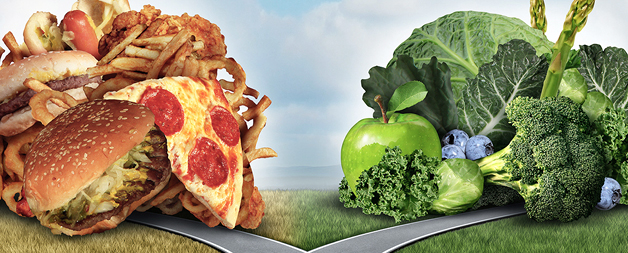
Food Facts
Knowing what’s right to eat, and what’s good for our health, is a tricky path to navigate. There are so many mixed messages to contend with, from clever marketing campaigns, hidden nasties, all the way through to well-meaning old wives tales passed down from generation to generation.
You’re not always going to get it right, and that’s ok, but here are five things you absolutely should know the truth about, as they are fundamental to balanced healthy eating.
Don’t be scared of frozen fruit and vegetables
Don’t get us wrong; fresh produce is best, as it gives us a greater quantity and variety of nutrients. But if we’re buying from a supermarket, the question is - how fresh is it anyway? The good news is that the nutrient values don’t differ much between fresh or frozen fruits and vegetables. However, vitamins and phytonutrients may be lost when sitting in our fridge at home or on the supermarket shelf.
Frozen fruits and vegetables have plenty of nutritional value. So, if fresh produce is unavailable, inconvenient, out of season or beyond your budget, frozen products provide plenty of nutrition. The fact is we simply need to eat them, much more than we do now. Fresh or frozen really doesn’t seem to make that much difference.
Keeping Hydrated
Don’t be worried about drinking too much water. Only worry about not eating and drinking correctly in combination. Drinking too much water will only be an issue if you are not eating correctly, which can cause hyponatremia. Hyponatremia occurs when the level of sodium in your blood is abnormally low. Most people will have an issue of not drinking enough water, rather than drinking too much.
The most important thing is to be sensible about it. If you are feeling like you are having to drink more than five litres per day in your daily activities, then you might reassess your day and plan to do activity in the cooler hours.
Some foods to eat that are going to be higher in sodium are cheese, pickles, pumpkin seeds, canned vegetable soup and even add some sauces or dressing to a meal if you are going to be requiring a lot of water.
Alcohol: it’s plain and simple – it is not good for your health
Although many have tried to claim that small amounts of alcohol (e.g. a glass of red wine a night) is good for our overall health, there is insufficient research to back this up.
The Negatives of Alcohol
- Alcohol is bad for the liver
- Alcohol is bad for the pancreas
- Alcohol is bad for the central nervous system
- Alcohol is bad for the kidneys
- Alcohol is bad for the stomach
- Alcohol contributes to bone degeneration
- Alcohol can affect both male and female fertility
- Long-term consumption can cause lung issues
This not meant to be a killjoy point, but rather a reminder that alcohol has only negative impacts on your health. We drink it for other reasons, as we eat junk food for other reasons. It’s just important to keep it in balance so that it doesn’t sabotage your overall health and wellbeing.
Fat-free is not the Key
Marshmallows clearly state on the packet that they are 99% fat free, yay, they must be healthy! You might as well buy a packet of sugar, as that could make the same claim. Unused energy from sugars don’t just spike your blood glucose, but they store all the excess sugars as fat eventually, but that statement just doesn’t look as good on the front of the packet!
In basic terms expect excess calories generally to translate into stored body fat. Protein, fat and carbohydrates each have preferred jobs in your body's healthy function, however, excess calories in general lead to weight gain. Too many calories from any of the three forms of macronutrients (fat, carbohydrate or protein) will lead to greater gains in fat (adipose tissue).
Understand a Balanced Intake
There is so much misinformation about what we should be eating. For example, not all carbohydrates, proteins or fats are created equal.
Carbs – Vegetables and fruit are carbohydrates, this is what we should be consuming five and two of per day respectively. The further away from growing up from the ground something looks – the less likely it is to be a good carbohydrate. Make sure you get plenty of fibre in your carbs as well.
Protein – Meats, Fish, mushrooms, eggs, nuts, lentils and the list goes on. It’s important to not overload on the fatty varieties, but protein is essential to a balanced diet that will help provide you with longer lasting energy.
Fats – There are different types of fats, some that are good, some that are evil. Check out some of the specific articles we have on cooking with fats, Omega 3’s and other specific information to help you get the right balance of fats in your daily diet.






Comments